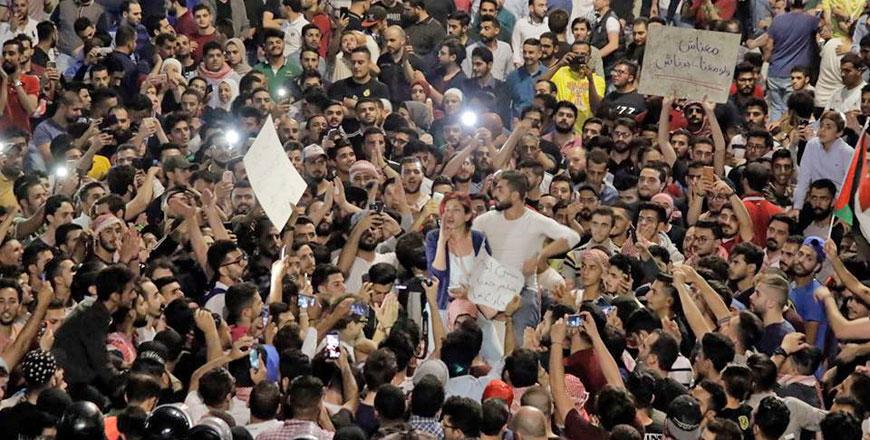You are here
68% of Jordanians supported June’s protests — poll
By Rana Husseini - Jul 05,2018 - Last updated at Jul 05,2018

A young woman leads the protesters during June's 9-day demonstrations outside the Prime Ministry in Amman (Photo by Osama Aqarbeh)
AMMAN — Sixty-eight per cent of Jordanians said they supported the recent protests that lead to the resignation of Premier Hani Mulki’s government in June, according to a local opinion poll.
Only 8 per cent were against the protests that started in late May and lasted for nine days, leading to the government’s resignation and the appointment of Prime Minister Omar Razzaz, according to the poll’s findings, which were released to the press on Wednesday.
The poll, conducted by the University of Jordan’s Centre for Strategic Studies (CSS), surveyed 1,824 Jordanian women and men aged over 18 since the day of the formation of Razzaz’s government, and a smaller group of 700 “opinion leaders”, including academics, intellectuals, media and business leaders and politicians.
The protests, which occurred at the Fourth Circle in Amman and other locations across the Kingdom, were against fuel and electricity price hikes by Mulki’s government, as well as an income tax draft law.
The protesters' calls found support across the country, and were followed by a Royal decree freezing the decision to hike prices and eventually the announcement, by the newly-appointed government in mid-June, to withdraw the income tax draft law.
Over 90 per cent of those surveyed stressed that the protests were the results of Mulki’s government policies, and only 4 per cent stated it was the result of an "external conspiracy against Jordan", CSS Director Musa Shteiwi said.
When asked about the main reasons that pushed the people to the streets to protest, Shteiwi said, 59 per cent of those surveyed said it was because of the draft income tax law, while 27 per cent stated that it was an accumulation of decisions taken by Mulki’s government, and 11 per cent pointed to the fact that the government raised electricity prices.
Some 94 per cent of those surveyed expressed their contentment with the way the security agencies handled the protests, and protesters, while 64 per cent expressed their approval of how the professional association dealt with the protests and only 26 per cent of those surveyed expressed their contentment with how the Lower House of Parliament dealt with the protests, added Shteiwi.
Meanwhile, 40 per cent of those surveyed said they followed the protest events regularly, while 50 per cent said they followed it occasionally and 10 per cent stated that they did not follow it at all, Shteiwi told the press.
“Around 76 per cent of the surveyed said they followed the protests on TV, while around 60 per cent said they got their information through friends and social media, especially Facebook,” Shteiwi added.
Related Articles
AMMAN — Only 30 per cent of the public and 35 per cent of opinion leaders believe that the situation in Jordan is going in the right directi
AMMAN — Over 55 per cent of Jordanians and 63 per cent of opinion leaders believe that the situation in Jordan is going in the right directi
AMMAN — Over 35 per cent of Jordanians and 44 per cent of opinion leaders believe that the overall situation in Jordan is going in the right

















